
[ad_1]
Crowdfunding is a common way for many small companies to get their start, and is especially common in the light electric vehicle industry for e-bike and e-scooter companies. But let’s face it, crowdfunding sites like Kickstarter and Indiegogo are still erroneously synonymous with scams in the minds of many.
Believe it or not, many of the biggest names in electric bicycle companies these days actually got their start on those platforms, proving that just because a company is pre-selling e-bikes doesn’t mean they won’t deliver.
That being said, there’s of course some legitimate basis for the aversion to crowdfunding held by many e-bike shoppers.
While these campaigns often present themselves as simple pre-order arrangements, the fine print says otherwise. Technically, backers (those forking over their cash) are simply pledging monetary support to a company, and that’s the end of the legal agreement. The companies doing the crowdfunding promise in exchange that backers will receive rewards or perks (the product being pre-sold). But that’s really all it is, a good faith promise.
While rare, a small number of companies have in fact taken in hundreds of thousands of dollars and failed to deliver the e-bike or e-scooter before, often due to changing market conditions during COVID-19 or various mismanagement reasons.
But those represent a tiny fraction of the cases. For the most part, successful crowdfunding campaigns result in successfully sending out pre-ordered e-bikes and e-scooters, though the products almost invariably arrive behind the predicted schedule.
It may surprise you to learn that some of the following major players in the e-bike market got their start just like this.
Rad Power Bikes
Technically speaking, Rad Power Bikes traces its lineage back over a decade and a half to when founder Mike Radenbaugh began hand-building his own DIY electric bicycles as custom-built orders.
And while that is true, the major leap forward that helped launch the company to its current position as the largest e-bike brand in North America came when Rad launched its RadRover fat tire electric bike on Indiegogo in 2015.
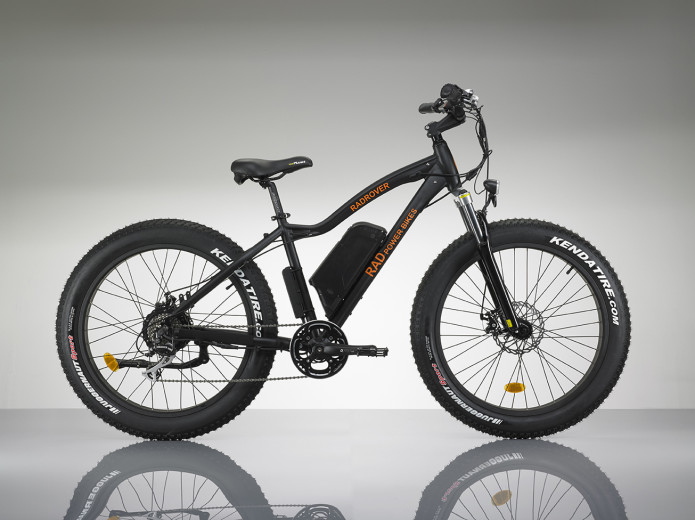
That campaign introduced the RadRover to a wider audience, managing to pre-sell the bikes for a price of $999.
Compare that to today’s prices for a $1,999 RadRover 6 Plus (which is admittedly a much higher-end e-bike than the original seven-year-old RadRover 1).
You can check out the new model in my first ride experience on the bike, seen in the video below.
Ultimately it just goes to show, today’s new entry to the market as a quaint little Indiegogo campaign could be tomorrow’s industry top dog, perhaps one day reaching Rad’s level of selling as many e-bikes in an afternoon as its original campaign sold in a month.
GoCycle
Today we know GoCycle as the ultra-premium folding electric bicycle company founded by former McLaren engineer Richard Thorpe. The bikes are fancy, space-age wonders that feature fast-folding designs with suspension, exotic materials, fully enclosed drivetrains, and more. The entry-level models can be found in the $3-4K range while the fanciest of the bunch head northwards to $6K or more.
But back in 2016, GoCycle was a much smaller company. After already rolling out in its domestic market of Europe, GoCycle went global with a Kickstarter campaign for its 2G and 2GS folding e-bikes.
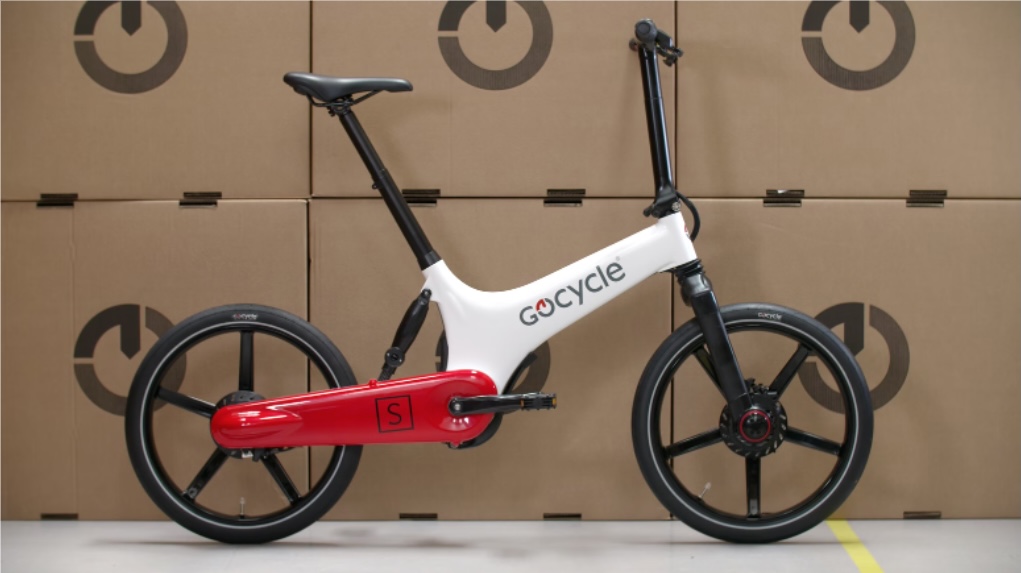
Back then, $1,999 was enough to land you a high-end folding e-bike – if you were brave enough to take a chance on the young company.
Sure, $2K was definitely a big ask back then. But compared to today’s prices, that’s practically pocket change.
SUPER73
Widely considered to be the leading lifestyle electric bike brand in the US (and probably much of the world, if we’re being honest), SUPER73 wasn’t always known as the marketing and branding powerhouse it is today.
Way back in 2016, it was launched as a small Kickstarter campaign with big aspirations.
The original Super73′ (back before the apostrophe was dropped) was upstart Lithium Cycles’ first offering, coming with similar speed and performance figures compared to today’s SUPER73 models, such as a 1,000W motor and a 25 mph limit.
But the original bike did so with some majorly different components, such as a Bafang mid-drive motor and a less elegant rack-style battery. $1,799 was enough to score the first model, which eventually went on to retail for $2,999.
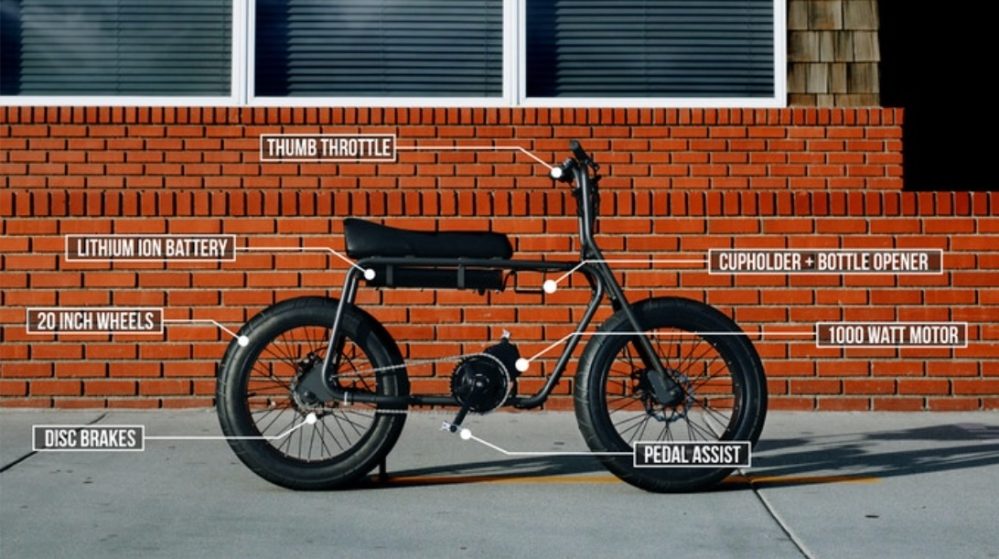
The brand has a come a long way in design and marketing, but their little known origins are a reminder of what is possible when a small community of backers help a plucky e-bike startup get rolling.
These days the e-bikes that fly out of SUPER73’s factory are much more polished and feature flashier designs, custom tires and more.
The company also regularly partners with famous brands to build custom models that leverage SUPER73’s unique styling.
Check out my recent test ride on a SUPER73 bike when my wife joined me for some joyriding around LA on a SUPER73-ZX, seen in the video below.
Biktrix
Going even further back to 2015 brings us to Canadian electric bike company Biktrix’s humble beginnings.
Long before Biktrix was innovating its own 2,500W electric bike drivetrains, the company got its start as a Kickstarter campaign for a humble fat tire electric bike.
A pledge of around US $1,699 was enough to land you the mid-drive Juggernaut fat tire electric bike, combining the thrill of all terrain riding with the performance of a Bafang BBS02 mid-drive motor.
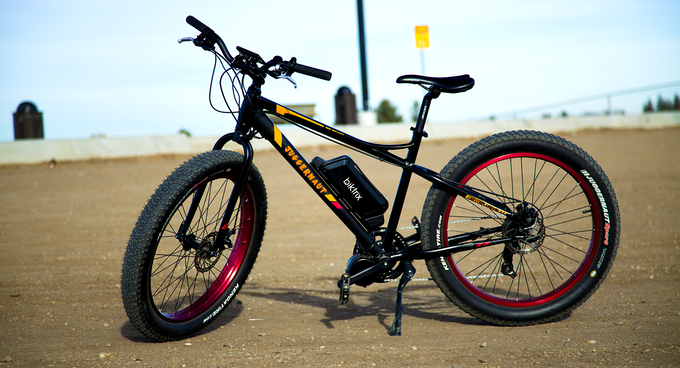
Today Biktrix is known as the Canadian leader in powerful high-performance electric bicycles.
The Juggernaut line is still alive and well, and the manufacturer’s mid-drive electric bikes as well as more affordable hub motor line are highly regarded.
But back in the day, they were just another startup looking for a chance to succeed.
Propella
Propella is known for its lightweight and iconic blue hipster-spec electric bikes that are favorites among the traditional-urban-cyclist-turned-electric-cyclist crowd.
But back in 2017, the company was just getting prepared to launch its second-generation e-bike with an Indiegogo campaign.
The e-bikes pre-sold for $949 for a single-speed version, which compares favorably to Propella’s $1,099 e-bike today.
That campaign even followed on the heels of a 2016 campaign for the original version 1 e-bike, which interestingly came with an option for hot pink rims.
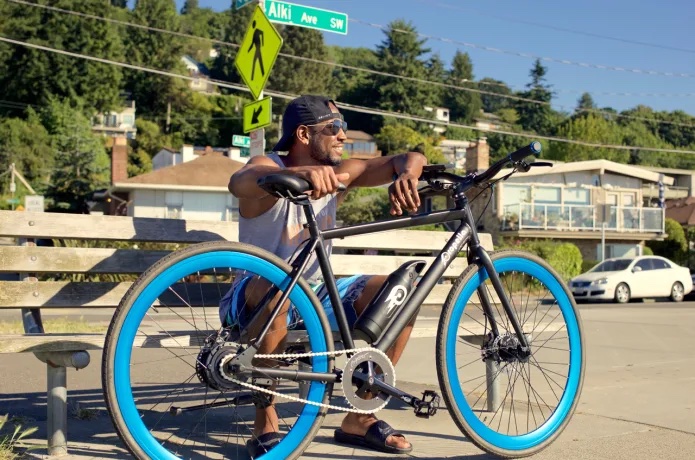
I never tried the second generation of the e-bike back in 2017, but I have tested out the current fourth-generation e-bike and fell in love with it immediately.
Propella has parlayed its crowdfunding success to launch a number of other models too, include a mini-sized e-bike with 20″ wheels for lower weight as well as a higher-end 9-speed electric bike that retains that urban messenger bike styling.
SONDORS
SONDORS is a big name in e-bikes these days, but the brand began with an infamous start when the company launched a $500 electric bike on Kickstarter.
The new company was believed to be a scam in many circles simply because at that point no manufacturer had managed to sell a $500 e-bike at a profit.
After a lawsuit-avoiding name change from the Storm e-bike to the SONDORS e-bike, the company shocked the naysayers when actually did deliver (though it’s anyone’s guess whether there was a profit margin left over in that first run of e-bikes).
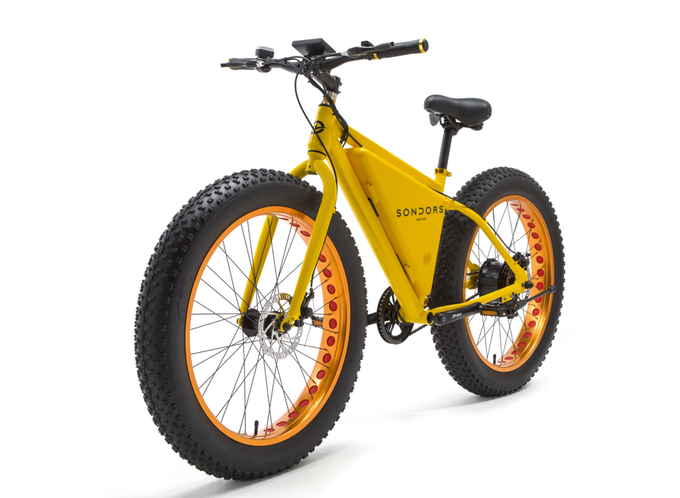
The campaign was so successful, raising nearly $1.4M, that it was one of the highest-funded Kickstarters of the time.
Today SONDORS not only has a wide range of low-cost and higher-end electric bicycles, but is dangerously close to delivering its first ever electric motorcycle model as well.
The days of a $500 fat tire e-bike, though? Sadly those are long gone.
ONYX
ONYX’s electric mopeds are classy, retro-inspired electric two-wheelers that bridge the gap between electric bicycles and electric motorcycles.
The ONYX RCR launched with impressive specs during a 2018 Indiegogo campaign, touting a top speed of 60 mph.
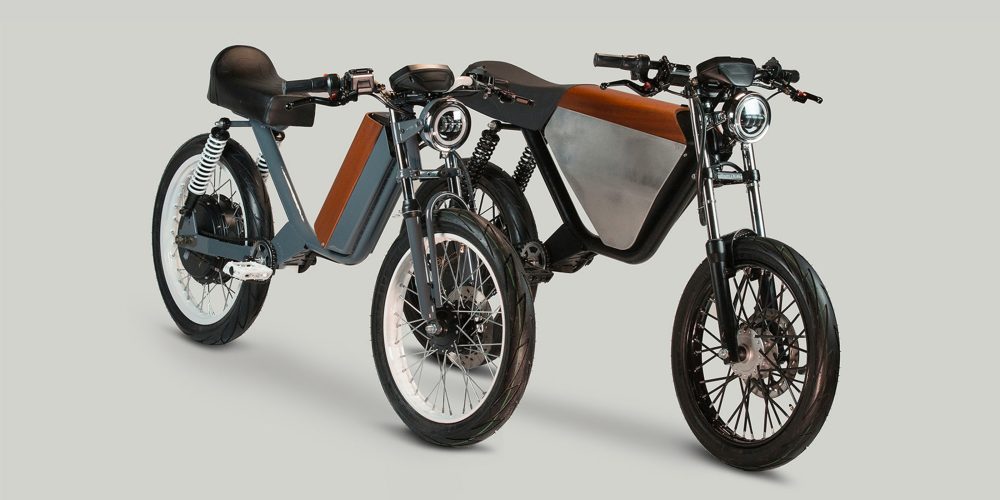
The bike was originally available for a modest price of $2,299. These days? An RCR will run you $4,349. This will forever be “the one that got away” for me.
For those that want to grab an ONYX style ride but don’t want to pay RCR prices, the company is relaunching its CTY2 step-through design for $3,699. The 45 mph top speed of the CTY2 is a bit more muted than the 60 mph RCR, but it still looks like a million bucks to me.
Kuberg
The Kuberg Freerider is a fairly well-known electric trail bike these days. It competes in a similar class as the famous Sur Ron Firefly as a lightweight but highly-capable off-road electric motorbike.
The Kickstarter campaign offered the full-suspension Kuberg Freerider – at the time rated for 2,000W of power and 34 mph (55 km/h) speeds – for just $1,999. The company also offered smaller versions for younger riders starting as low as $799.
The campaign barely reached a third of the $100,000 goal and thus didn’t succeed, meaning the 24 backers who opened their wallets didn’t end up on the hook for the bikes.
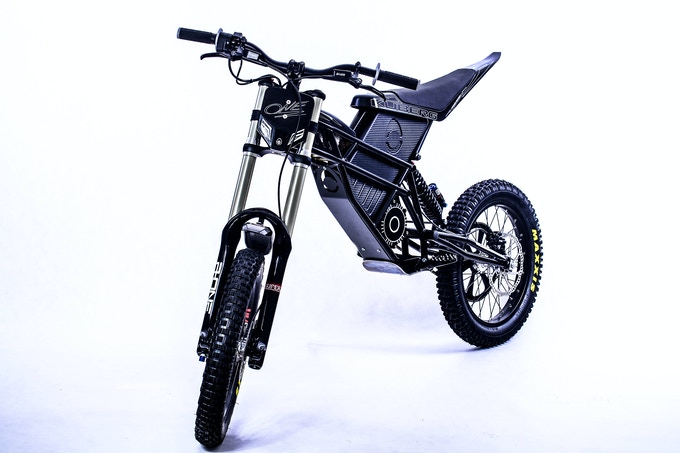
Even so, Kuberg soldiered on and the rest is history. Today Kuberg’s popular bikes include many models, and the Freerider has increased in price to $5,500, though the speed and power have increased considerably to 43 mph and 14,000W.
JackRabbit
The JackRabbit may look like a funky little electric scooter, but this “micro electric bike” as the brand calls it is actually a fun and easy-to-use alternative to larger electric bikes and scooters.
I know because I tried it. And it was awesome.
It’s not technically an e-bike since it doesn’t have pedals, but instead allows the rider to rest his or her feet on foot pegs.
Even so, it gives a bicycle-like ride thanks to the larger 20″ wheels. Compared to a typical standing electric scooter, it’s a lot more confidence inspiring.
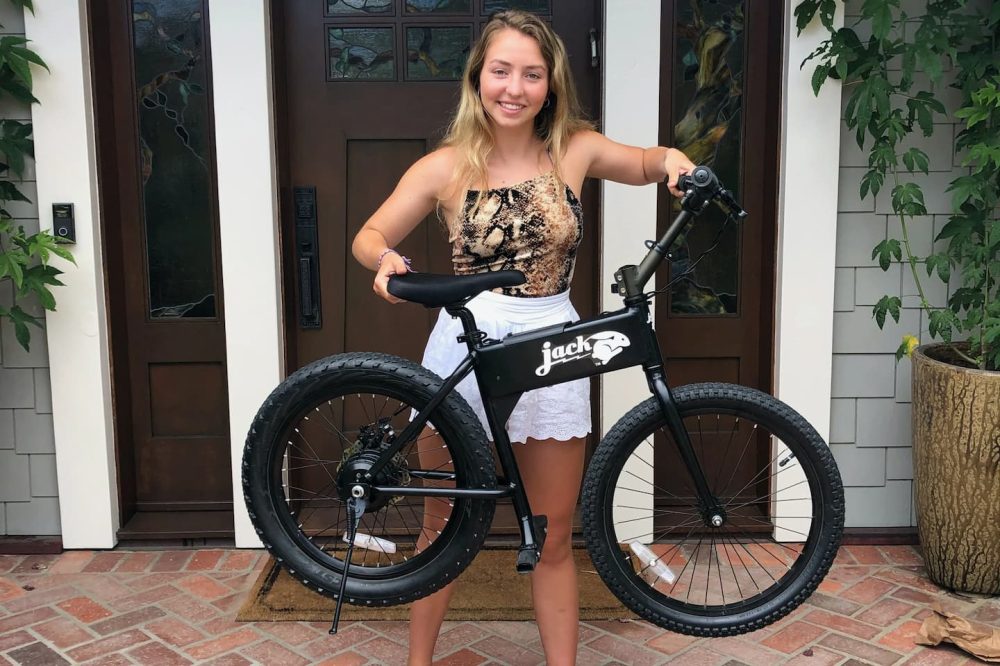
And while today you can just pluck one off the company’s website, JackRabbit originally got its start as a Kickstarter campaign back in 2018.
Back then the small sum of $449 got you your own odd little electric two-wheeler, if you were brave enough to pre-order it and risk your cash.
Today the bike, in new and improved form, runs for $999.
It’s really a fun little runabout, and you can see my own review of it in the video below.
A-Ride
A-Ride, the wacky and wild mashup between an electric mountain bike and a standing scooter that we checked out at the last CES, also benefitted from a crowdfunding launch.
The Canadian company got a big boost on Indiegogo in 2020, launching the novel form of electric transportation and recreation for a pre-order price of around US $3,200.
These days the price is a bit higher at around US $4,580.
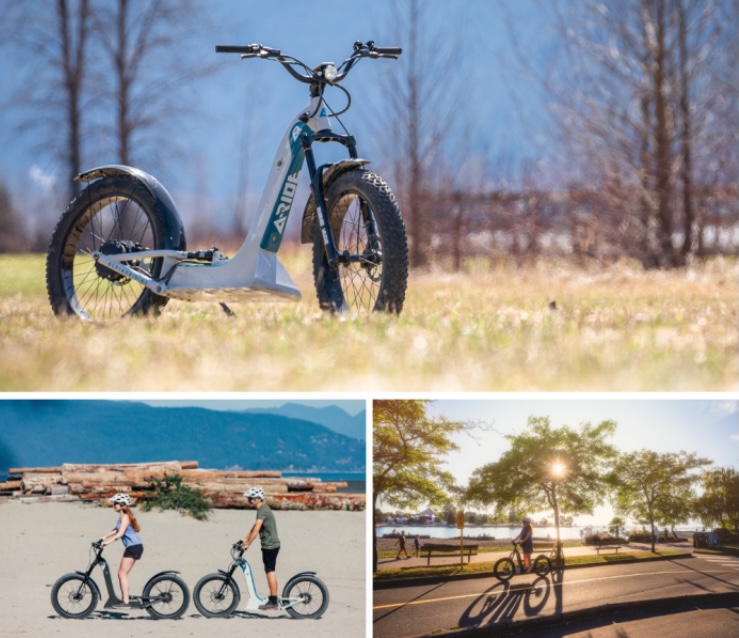
Early backers certainly took a risk on both a new design and a new company. But that risk paid off for the more than 100 early adopters that put up the cash to help A-Ride grow into the company it is today.
It just goes to show that a novel and head-scratching design may look odd, but could just become the next big thing.
Cero
Cero is known for its high-quality mid-drive cargo e-bikes that rock a smaller front wheel for lower a center of gravity.
It’s a neat design that we tested ourselves, instantly becoming smitten with the bike.
But before the brand grew to its present status, it was running a Kickstarter campaign to try and get started. And interestingly, it didn’t even succeed.
The company tried to pre-sell its electric cargo bikes for $2,399 but only made it half way to its funding goal. That meant that none of the backers actually paid the company, since no funds are transferred when a Kickstarter campaign doesn’t succeed to reach its goal.
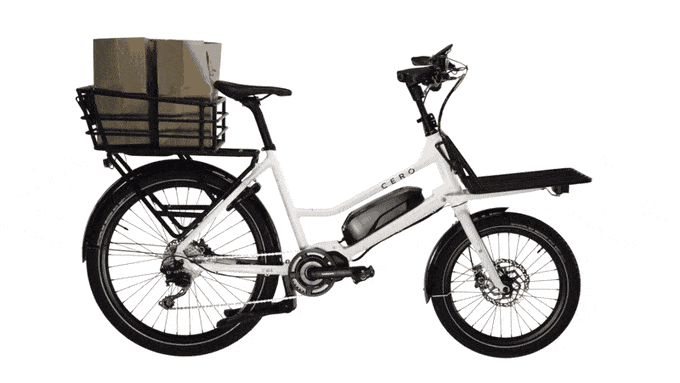
A lack of a successful campaign didn’t stop Cero from forging ahead, and the brand was still able to grow in an impressive comeback story.
Now the Cero One is a respected and unique entry in the global electric cargo bike market, despite its rocky start on Kickstarter. Oh yeah, and these days it is priced at $3,799. Kind of makes you wish you could have grabbed it for the Kickstarter price and saved $1,400!
Humble beginnings
While we typically think of the huge electric bike companies we know today as having always been there, many titans of the industry began as humble little crowdfunding projects.
These days we see plenty of new startups trying to get their footing with interesting and novel designs in the personal electric mobility space.
Could any of these be the next big thing? If history is any guide, they just may be!
FTC: We use income earning auto affiliate links. More.
Subscribe to Electrek on YouTube for exclusive videos and subscribe to the podcast.
[ad_2]